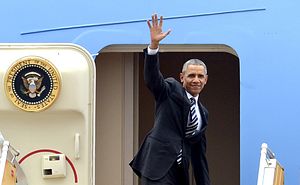During his trip to Asia last week, U.S. President Barack Obama took the opportunity to tell an audience in Vietnam why the Trans-Pacific Partnership is so important. Since the Vietnamese people may be the greatest beneficiaries of the agreement, this was an excellent venue to praise the power of globalization to bring about shared prosperity to people around the world.
But instead of extolling the virtues of free trade, Obama lamented the disruptions caused by globalization and assured his audience that the TPP would alleviate them by imposing strong labor and environment regulations.
He summed up his pitch with an argument about fairness for American companies:
So the argument that I’ve made and I will continue to make in the United States is that we’re not going to be able to end globalization. We have to make globalization work for us. And that means that we don’t try to put barriers and walls between us and the rest of the world; but instead, we try to make sure that the world has high standards, treats our companies fairly. And if we do that, I’m confident we can compete with anybody.
It’s good that Obama wants to avoid putting up barriers, but he’s trying to sell a free trade agreement without even mentioning the virtues of free trade. In fact, by positioning the TPP as an alternative to trade barriers, Obama is paradoxically offering a protectionist’s pitch for a free trade agreement.
Obama’s messaging on TPP appears carefully calibrated to appeal to trade skeptics in the United States, especially those in Obama’s own party, who blame trade agreements like the TPP for job losses. Instead of refuting their arguments, he commiserates with them when he says that “a lot of Americans saw companies close and saw what they viewed as their jobs being exported to China.”
Obama assures the trade skeptics that, while “some of the previous trade agreements did not have enforceable labor protections or environmental protections,” the TPP is going to have “high standards” that “create a level playing field.” His administration has even called the TPP “the most progressive trade agreement in history.”
As an effort to garner domestic political support, this approach has obviously failed, and the vast majority of congressional Democrats remain publicly opposed to the TPP with time running out for possible ratification this year.
What Obama may be missing is that many Democrats are perfectly willing to fight against globalization rather than shape it. Historically, labor and environment provisions have been a salve for aggrieved interest groups because labor and environment concerns are among their top complaints. But many would be perfectly happy to ditch those rules in exchange for more protectionism. In other words, the “high standards” that Obama has championed in the TPP might make the agreement less bad in the eyes of its critics, but they will never make it good.
It’s also not true that the TPP is fundamentally different from past agreements. It is true that some past agreements, like NAFTA, don’t have enforceable labor and environment provisions, but NAFTA is over 20 years old. Since then, the labor and environment rules in U.S. trade agreements have become increasingly more stringent. Every single U.S. trade agreement ratified since 2007 has had “fully enforceable” labor and environment provisions.
The TPP is just the latest in a long line of increasingly “rules”-oriented trade agreements, and while it adds new rules (some good and some bad) in important areas, the TPP’s labor and environment provisions are not particularly special.
The president’s focus on rules is not only unpersuasive and misleading, it’s also a missed opportunity to make a positive pitch for liberal economic policy. What Obama should have told that audience in Vietnam is that open trade is good for everyone.
The fact is that globalization already “works for us.” It works for consumers, who enjoy a greater variety of goods and services at lower costs. It works for businesses, who enjoy access to imported materials and services. And it works for workers around the world, who enjoy higher wages in new jobs created by foreign investment and access to export markets.
Free trade is universally good. The value of free trade agreements is in how they lower protectionist trade barriers that divert the gains of economic exchange to a narrow group of politically connected rent-seekers. Trade negotiators on both sides ought to share a common goal of maximum liberalization.
When Obama claims that the TPP will be good because America gets to make the rules, he is fueling the rhetoric of nationalist demagogues—like Donald Trump—who think the point of trade negotiations is to win by getting the best deal for your own country. Thinking of trade or trade agreements as a competition is anathema to the basic rationale for free trade, which is that protectionism is not in the national interest.
What the U.S. economy and global trading system really need is someone who can champion the values of open commerce and economic liberalism. Obama has chosen not to provide that much-needed leadership. The consequences are apparent in his failure to push the TPP through Congress and in the growing power of protectionist rhetoric in the 2016 presidential campaigns.
Bill Watson is a trade policy analyst at the Cato Institute’s Herbert A Stiefel Center for Trade Policy Studies.

































